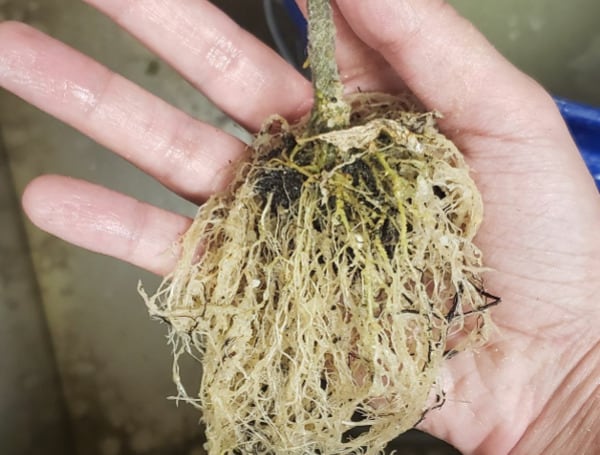Root-Knot nematodes, Courtesy, Peter DiGennaro, UF/IFAS Parasitic nematodes are responsible for about $125 billion in annual crop loss worldwide,
Parasitic nematodes are responsible for about $125 billion in annual crop loss worldwide, and they can cause farmers to lose up to 80% of their tomato yield.
“The situation with nematodes is exacerbated by an emerging concern in agriculture: the effect of warming nighttime temperatures. This unprecedented trend is causing critical challenges to crops,” said University of Florida scientist Peter DiGennaro.
DiGennaro has been awarded $2.3 million to get to the root of the problem. He and two colleagues from North Carolina State University have been awarded $1.8 million from the National Science Foundation and $500,000 from the U.S. Department of Agriculture to conduct the research.
With the grants, researchers will study how the genome – all of the genetic material – in tomato plants alters the behavior of the plant and pathogens during those increasingly warm evenings.
Over the years, plants have adapted well to a consistent global temperature difference between day and night. In the past few decades, however, this difference has begun to shrink.
“Increasing nighttime temperatures, even as little as 4 degrees, have been connected to reduced yield, biomass and grain quality as well as disease severity,” said DiGennaro, a UF/IFAS assistant professor of entomology and nematology.
In the news: Florida Man’s Carjacking Spree Thwarted A Few Counties Away From Where It Started
As it stands, growers are limited how they can control nematodes, DiGennaro said. They can apply nematicides or pesticides or grow tomatoes that resist underground wormlike creatures.
The research will help develop new ways to grow crops that are more resilient to nematode damage and increasing temperatures.
“We also see broader impacts in the future as an outcome of this research. We can identify types of tomato plants that are more resilient to warmer climates. We also want to elucidate the molecular biology behind the nematodes’ response to tomato plants under warmer nighttime temperatures,” DiGennaro said.
The new research will reach beyond identifying relevant genes in tomato plants.
“Understanding the nematode and the plant paves the way towards targeting the parasite directly. We are more interested in the plant genes than the nematode genes,” DiGennaro said. “We want to know how plants, through their genes, control their responses to nematodes and higher temperatures.”
DiGennaro will conduct the research with Dahlia Nielsen, an associate professor of biological sciences and Colleen Doherty, an associate professor of molecular and structural biochemistry, both at N.C. State.
Visit Tampafp.com for Politics, Tampa Area Local News, Sports, and National Headlines. Support journalism by clicking here to our GiveSendGo or sign up for our free newsletter by clicking here.
Android Users, Click Here To Download The Free Press App And Never Miss A Story. Follow Us On Facebook Here Or Twitter Here.
Copyright 2022 The Free Press, LLC, tampafp.com. All rights reserved. This material may not be published, broadcast, rewritten, or redistributed.

